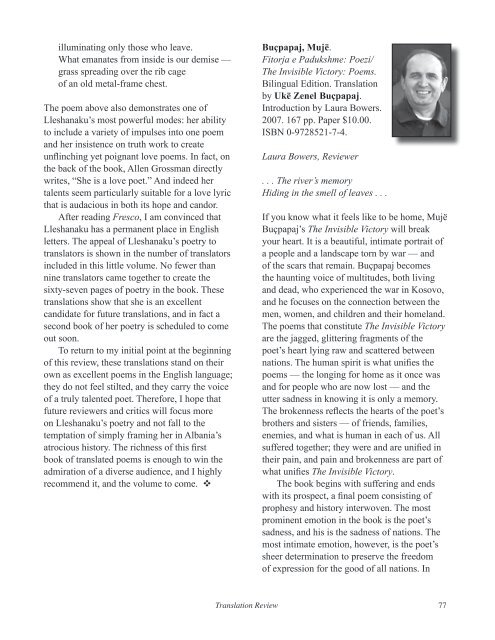Table of contents - The University of Texas at Dallas
Table of contents - The University of Texas at Dallas
Table of contents - The University of Texas at Dallas
Create successful ePaper yourself
Turn your PDF publications into a flip-book with our unique Google optimized e-Paper software.
illumin<strong>at</strong>ing only those who leave.<br />
Wh<strong>at</strong> eman<strong>at</strong>es from inside is our demise —<br />
grass spreading over the rib cage<br />
<strong>of</strong> an old metal-frame chest.<br />
<strong>The</strong> poem above also demonstr<strong>at</strong>es one <strong>of</strong><br />
Lleshanaku’s most powerful modes: her ability<br />
to include a variety <strong>of</strong> impulses into one poem<br />
and her insistence on truth work to cre<strong>at</strong>e<br />
unflinching yet poignant love poems. In fact, on<br />
the back <strong>of</strong> the book, Allen Grossman directly<br />
writes, “She is a love poet.” And indeed her<br />
talents seem particularly suitable for a love lyric<br />
th<strong>at</strong> is audacious in both its hope and candor.<br />
After reading Fresco, I am convinced th<strong>at</strong><br />
Lleshanaku has a permanent place in English<br />
letters. <strong>The</strong> appeal <strong>of</strong> Lleshanaku’s poetry to<br />
transl<strong>at</strong>ors is shown in the number <strong>of</strong> transl<strong>at</strong>ors<br />
included in this little volume. No fewer than<br />
nine transl<strong>at</strong>ors came together to cre<strong>at</strong>e the<br />
sixty-seven pages <strong>of</strong> poetry in the book. <strong>The</strong>se<br />
transl<strong>at</strong>ions show th<strong>at</strong> she is an excellent<br />
candid<strong>at</strong>e for future transl<strong>at</strong>ions, and in fact a<br />
second book <strong>of</strong> her poetry is scheduled to come<br />
out soon.<br />
To return to my initial point <strong>at</strong> the beginning<br />
<strong>of</strong> this review, these transl<strong>at</strong>ions stand on their<br />
own as excellent poems in the English language;<br />
they do not feel stilted, and they carry the voice<br />
<strong>of</strong> a truly talented poet. <strong>The</strong>refore, I hope th<strong>at</strong><br />
future reviewers and critics will focus more<br />
on Lleshanaku’s poetry and not fall to the<br />
tempt<strong>at</strong>ion <strong>of</strong> simply framing her in Albania’s<br />
<strong>at</strong>rocious history. <strong>The</strong> richness <strong>of</strong> this first<br />
book <strong>of</strong> transl<strong>at</strong>ed poems is enough to win the<br />
admir<strong>at</strong>ion <strong>of</strong> a diverse audience, and I highly<br />
recommend it, and the volume to come. v<br />
Buçpapaj, Mujë.<br />
Fitorja e Padukshme: Poezi/<br />
<strong>The</strong> Invisible Victory: Poems.<br />
Bilingual Edition. Transl<strong>at</strong>ion<br />
by Ukë Zenel .Buçpapaj.<br />
Introduction by Laura Bowers.<br />
2007. 167 pp. Paper $10.00.<br />
ISBN 0-9728521-7-4.<br />
Laura Bowers, Reviewer<br />
. . . <strong>The</strong> river’s memory<br />
Hiding in the smell <strong>of</strong> leaves . . .<br />
If you know wh<strong>at</strong> it feels like to be home, Mujë<br />
Buçpapaj’s <strong>The</strong> Invisible Victory will break<br />
your heart. It is a beautiful, intim<strong>at</strong>e portrait <strong>of</strong><br />
a people and a landscape torn by war — and<br />
<strong>of</strong> the scars th<strong>at</strong> remain. Buçpapaj becomes<br />
the haunting voice <strong>of</strong> multitudes, both living<br />
and dead, who experienced the war in Kosovo,<br />
and he focuses on the connection between the<br />
men, women, and children and their homeland.<br />
<strong>The</strong> poems th<strong>at</strong> constitute <strong>The</strong> Invisible Victory<br />
are the jagged, glittering fragments <strong>of</strong> the<br />
poet’s heart lying raw and sc<strong>at</strong>tered between<br />
n<strong>at</strong>ions. <strong>The</strong> human spirit is wh<strong>at</strong> unifies the<br />
poems — the longing for home as it once was<br />
and for people who are now lost — and the<br />
utter sadness in knowing it is only a memory.<br />
<strong>The</strong> brokenness reflects the hearts <strong>of</strong> the poet’s<br />
brothers and sisters — <strong>of</strong> friends, families,<br />
enemies, and wh<strong>at</strong> is human in each <strong>of</strong> us. All<br />
suffered together; they were and are unified in<br />
their pain, and pain and brokenness are part <strong>of</strong><br />
wh<strong>at</strong> unifies <strong>The</strong> Invisible Victory.<br />
<strong>The</strong> book begins with suffering and ends<br />
with its prospect, a final poem consisting <strong>of</strong><br />
prophesy and history interwoven. <strong>The</strong> most<br />
prominent emotion in the book is the poet’s<br />
sadness, and his is the sadness <strong>of</strong> n<strong>at</strong>ions. <strong>The</strong><br />
most intim<strong>at</strong>e emotion, however, is the poet’s<br />
sheer determin<strong>at</strong>ion to preserve the freedom<br />
<strong>of</strong> expression for the good <strong>of</strong> all n<strong>at</strong>ions. In<br />
Transl<strong>at</strong>ion Review 77

















